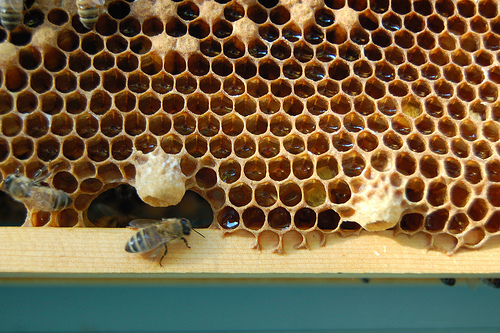Are My Bee's Going To Swarm???
Probably one of the most common fears a newer beekeeper has is that her/his hive will swarm. Typically the first time a hive "beards" to reduce internal temperatures, they think it is a swarm ready to happen!
Colonies absolutely do swarm, but with a few things to watch out for, a beekeeper can determine if swarming is a possibility. The following is a decision tree I use when doing inspections and determining swarm status.
[STEP 1] Is your colony new from a package?
If yes, chances are greatly reduced that they will swarm. Be sure to add boxes when 8 out of 10 frames are filled and you shouldn't have swarms.
If your bees have over-wintered (they made it through a full summer/winter cycle), swarming chances are greatly increased.
[STEP 2] Do you see a lot of drones?
A good indicator to start watching for swarms is the presence of drones. Once they start to appear, start watching how fast the population grows
[STEP 3] Has the population started growing?
Do you see eggs, larvae, and pupae? Is there an obvious growth in the population since your first winter/spring inspection? If so, time to start looking for swarm cells and queen cups.
[STEP 4] Are there swarm cells or queen cups?
If a colony is prepping to swarm, they need a new queen, to do this they prep queen cells, starting with queen cups.
Look towards the bottom of the frames in the middle of the hive. This is typically where the brood is, and where you'll find queen cups. They look similar to a overturned coffee cup and could be around 5 to 10 of them.
Two queen cups at the bottom of a brood frame.
If you see this, it's time to split your hive, like now! Once a hive decides it's time to swarm, they are going to swarm.
Fully mature queen cups slightly resemble a small peanut. This indicates swarming could be days away. Even splitting them at this point may not stop it so keep your eyes open.
Fully mature swarm cells
SUMMARY
Keep your eyes open for these indicators. Once things start to move, they happen fast. In Seattle, swarm season starts as early as Mid-April and lasts until June. Even hives that have swarmed may swarm once or twice more so keep an eye out!
If your bees have swarmed, it's best to call a mentor to help you get them if you've never done it. Many clubs have SWARM LISTS so I advise you contact one to show you the ropes.
FINAL THOUGHTS
As a responsible beekeeper, it's important to prevent swarming. Swarms can be scary to neighbors who only know what they've seen in movies and on tv, which is typically sensationalized. But, if your hive does swarm, don't feel like this is a failure. Even the best keepers miss the signs at times.


